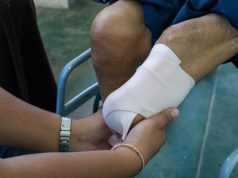Increased odds of antiplatelet therapy, statins, ACEI/ARB, smoking counseling with comorbid CAD
WEDNESDAY, May 3, 2017 (HealthDay News) — Patients with peripheral artery disease (PAD) have low use of medication therapy and lifestyle counseling, according to a study published in the May 9 issue of the Journal of the American College of Cardiology.
Jeffrey S. Berger, M.D., from the New York University School of Medicine in New York City, and Joseph A. Ladapo, M.D., Ph.D., from the David Geffen School of Medicine at the University of California, Los Angeles, examined trends in medication use and lifestyle counseling for 1,982 outpatient visits among patients with PAD from 2005 through 2012.
The researchers found that in 24.3 percent of visits, comorbid coronary artery disease (CAD) was present. There was low medication use for cardiovascular prevention and symptoms of claudication: any antiplatelet therapy in 35.7 percent, statin in 33.1 percent, angiotensin-converting enzyme inhibitor (ACEI)/angiotensin receptor blocker (ARB) in 28.4 percent, and cilostazol in 4.7 percent of visits. In 22 percent of visits, exercise or diet counseling was used. Smoking cessation counseling or medication was used during 35.8 percent of visits among current smokers with PAD. Over time there was no significant change in medication use or lifestyle counseling. Compared to patients with PAD alone, those with comorbid CAD and PAD were more likely to be prescribed antiplatelet therapy, statins, ACEI/ARB, and smoking cessation counseling (odds ratios, 2.6, 2.6, 2.6, and 4.4, respectively).
“The use of guideline-recommended therapies in patients with PAD was much lower than expected,” the authors write.
One author disclosed financial ties to the pharmaceutical industry.
Copyright © 2017 HealthDay. All rights reserved.








